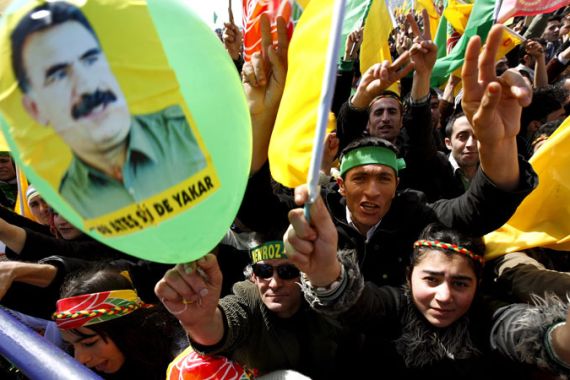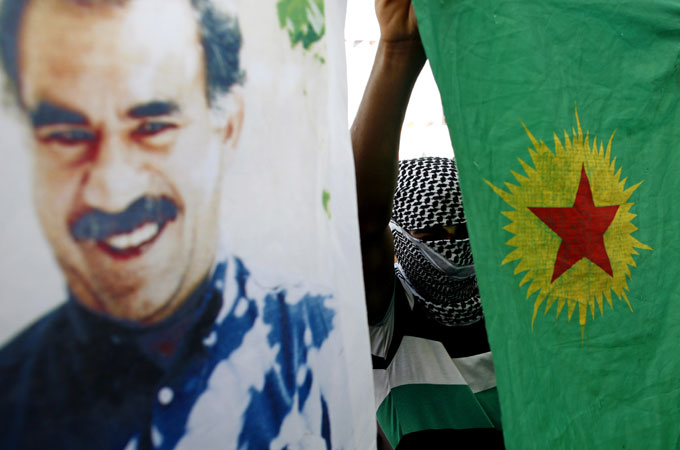Kurds could revolt if grievances aren’t fixed
Turkey’s leaders must face up to Kurdish concerns, or risk provoking Middle East-inspired civil unrest.

 |
| A masked Kurdish demonstrator holds a PKK flag next to a portrait of Abdullah Ocalan, the group’s jailed leader [EPA] |
In 1923, when Mustafa Kemal Ataturk founded the Republic of Turkey from the ashes of the multi-ethnic Ottoman Empire, there were two significant groups that opposed the formation of a secular nation state: Islamists and Kurds.
Whereas Islamists supported the continuation of sharia law and the sultanate and were against the westernisation of society and politics, Kurds realised that there was no place for their ethnic and cultural rights in the newly established Turkish nation state.
Kemal’s right-hand man, Ismet Inonu, made a speech in 1925 in which he summarised the Turkification campaign aimed at other ethnic groups: “As Turks are in the majority, other groups do not have any power. Our mission is to Turkify non-Turkish groups in the Turkish homeland. We are going to eradicate groups who oppose Turks and Turkishness.”
Indeed, Turkish nationalism prompted the reaction of Kurds, who revolted numerous times during the early republican period against the assimilation campaign and each time were harshly suppressed by the Turkish military.
Language banned
Until the 1980s, Turkey’s political establishment had refused to recognise the existence of Kurds and instead used the derogatory term “mountain Turks”. The Kurdish language was banned in education, media and in parliament.
However, this policy of ignoring the existence of a distinct Kurdish identity started to be challenged by the Marxist-Leninist Kurdistan Workers’ Party (PKK), founded by Abdullah Ocalan in the late 1970s.
 |
The PKK, classified as a terrorist organisation by the European Union and the United States, waged an armed campaign against the Turkish state in southeast Turkey that aimed at independence for the Kurds. Compared with ETA in Spain and the IRA in Northern Ireland, whose armed campaigns killed hundreds respectively, the PKK’s armed insurgency was bloodier and the death toll has reached more than 40,000 people since 1984.
The intensity of the conflict decreased significantly after 1999, when Ocalan was captured. He has since been serving a life term. Since then the PKK leader has prioritised the political struggle rather than the armed one, renounced separatism, and announced that the Kurdish problem would only be solved through the autonomy of Kurds in “a democratic republic”.
However the Turkish political establishment, mainly the military and judiciary, considered the recognition of Kurdish rights as a first step that would lead to the collapse of Turkey and ultimately independence of the Kurds. In the last two decades the Constitutional Court banned four Kurdish parties because of links with the PKK.
Enter Erdogan
The deadlock between the PKK and the Turkish state continued until the rise to power of Erdogan – an outsider to Turkey’s ruling elite – in 2002. This changed the political balance significantly. The AKP (Justice and Development Party), having originated in the Islamist movement, was accused by the secular-nationalist establishment of pursuing a secret Islamic agenda.
The clash between the two camps peaked in 2008 when the AKP narrowly escaped being banned by the constitutional court for alleged anti-secular activity.
Erdogan’s distance from the Kemalist establishment has made the AKP acceptable to many Kurds. He became the first Turkish prime minister who recognised the Kurdish problem as a problem of ethnic identity rather than economic backwardness.
In 2005, in a ground-breaking way, Erdogan acknowledged that “the state made mistakes about the Kurdish issue”. The AKP’s reformist approach had a deep impact on Kurds in the 2007 general election. In the predominantly Kurdish south-eastern part of Turkey, the AKP surpassed the Kurdish Party and doubled its vote from 26 per cent to 53 per cent.
Indeed, with its Islamist-conservative discourse, the AKP succeeded in overcoming the conflict between Turkish and Kurdish nationalisms and became the party of all people in Turkey from different ethnic backgrounds.
In 2009, in an effort to find a lasting settlement, Erdogan launched “the Kurdish opening”: improving cultural rights for Kurds, launching the first state television channel in Kurdish language, and encouraging PKK fighters to lay down their arms and return from the mountains.
‘Treacherous project’
When 34 PKK members returned to Turkey from the mountains of northern Iraq dressed in guerrilla outfits and joined “victory celebrations” at mass rallies in October 2009, the two main opposition parties, the secularist CHP (Republican People’s Party) and nationalist MHP (Nationalist Movement Party), branded the “Kurdish opening” a “treacherous project”, declared that AKP was negotiating with the “enemy” and would pay the price for its “treason”.
 |
Soon the rapprochement with the Kurdish side stopped and the PKK resumed fighting. Erdogan’s biggest concern was the upcoming general elections and the possible loss of votes from those inflamed by the nationalist campaign of the opposition.
To appease the growing Turkish nationalist reaction, the government arrested hundreds of Kurds, including politicians, and accused them of being the urban wing of the PKK.
The most crucial issue after the general election will be the writing of the first civil constitution that will mark a clear break from military tutelage, since the current constitution is a product of the military regime which came to power after the coup of September 1980.
During that process, the cultural and political rights of the Kurds will be fiercely debated by Kurdish and Turkish nationalists, secularists and conservatives. According to recent polls Erdogan is expected to form a majority government and he has showed signs of stepping back from his previous reformist stance on the Kurdish problem.
During the election campaign, Erdogan put forward the socio-economic development of southeast Turkey and did not discuss the political reforms for Kurds. He said “there is no Kurdish issue but problems of the Kurdish people”.
Nevertheless, the Kurdish Peace and Democracy Party (BDP) emphasised that the new constitution should recognise autonomy for Kurds and education in the Kurdish language. Moreover, Abdullah Ocalan, who retains his power over the Kurdish movement even from his jail cell, warned that “all hell will break loose” if fully-fledged negotiations for a settlement between himself and the Turkish government do not commence after the elections.
Erdogan’s nationalist tone in the election campaign aims to lure voters away from the opposition parties, and presumably will change after the election as the AKP will need the support of the Kurdish MPs to write a new constitution.
However, many Kurds consider Erdogan’s stance as a strategy to stall reforms demanded by Ocalan. If a new constitution fails to address Kurdish concerns, the PKK might renew its struggle, not only through an armed campaign, as happened in the last two decades, but also through a campaign of civil disobedience, which has become very popular in the Middle East in the recent months.
Dr Behlul Ozkan currently teaches at Mamara University in Istanbul. His book, From the Abode of Islam to Turkish Vatan, will be published by Yale University Press in 2012.
The views expressed in this article are the author’s own and do not necessarily reflect Al Jazeera’s editorial policy.
